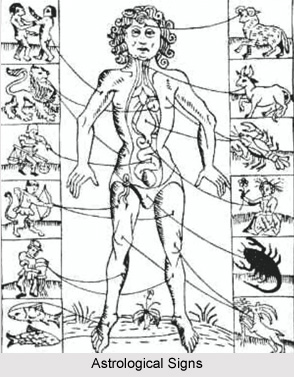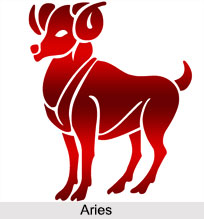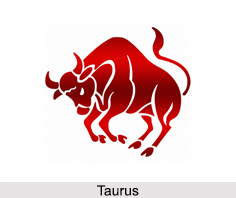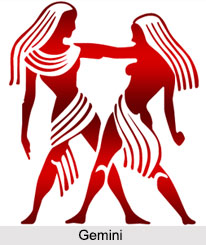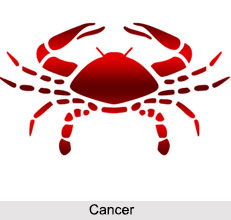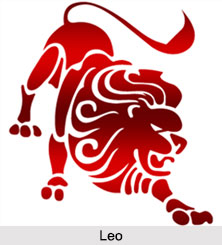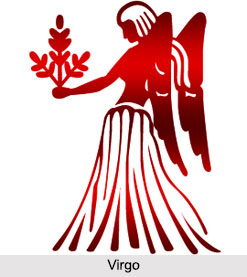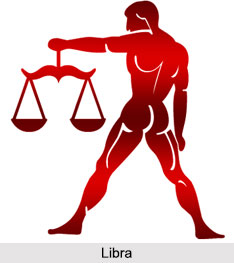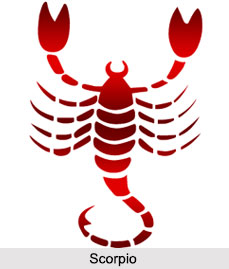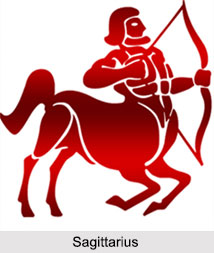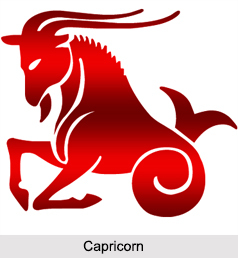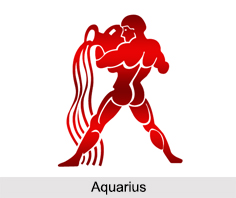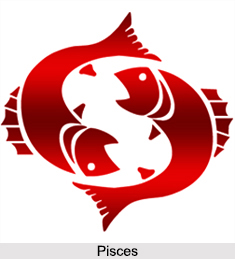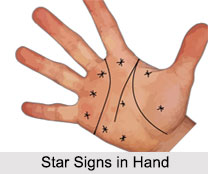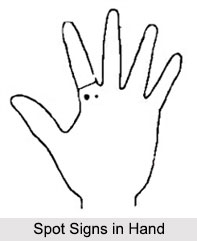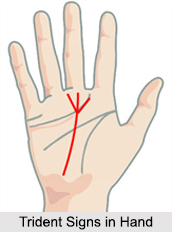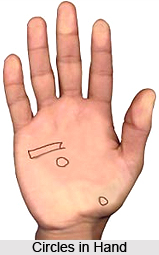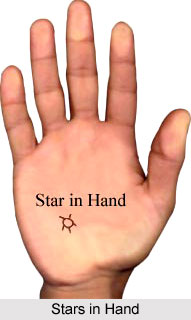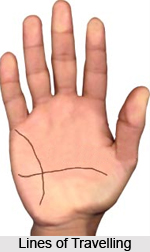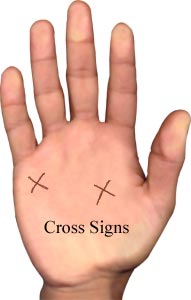Introduction
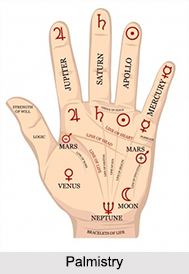 Palmistry or "Hasta Rekha Vigyan" is the most popular branch of Samudrik Shastra. The original Samudrik Hasta Rekha embodies Vedic philosophy within itself in a coalition with all the cosmic forces available. Up to 153 lines are recognized and studied well in the palm. A more spiritual insight in the readings is done by defining and studying the Atma Rekha.
Palmistry or "Hasta Rekha Vigyan" is the most popular branch of Samudrik Shastra. The original Samudrik Hasta Rekha embodies Vedic philosophy within itself in a coalition with all the cosmic forces available. Up to 153 lines are recognized and studied well in the palm. A more spiritual insight in the readings is done by defining and studying the Atma Rekha.
History of Palmistry
Palmistry is a method of counseling that originated in India over 3,000 years ago. It is a part of a vast field of study, referred to as Samudrik Shastra. This literally means the ocean of knowledge. Palmistry is a sub-section of this vast knowledge that deals specifically with the study of the hand and the imprints therein. This is not foretelling. The original intent of palmistry was for personality assessment and counseling. One`s social attitudes, conscious awareness, emotional tendencies, and subconscious fears, blockages and strengths can be understood in great detail through this in-depth system. In palmistry it analyses the hand and the markings on it carry different meaning. Though these days it is used to predict the future of an individual, palmistry does well with the personality assessment task.
Palmistry existed in India for a few thousand years BC. Palmistry did not arrive in Europe till the 12th Century. Indian hand reading had already spread to China and Japan where it was refined. Arabic traders picked it up on their travels and took it to Europe. But since it was linked to Islam, Christian translators applied their own religious symbolism to the meanings of the hands at different Universities. Not after long period to this, the first European palmistry books appeared. In the 14th Century the Gypsies came to Europe from India with their system of Indian hand reading and combined it with their gifts for clairvoyance. Thus it can be said that these early forms of hand reading i.e. Arabic, Christian, and Gypsy, all came from ancient Indian palmistry as well.
The human palm best reveals the story of the human life in the past, present and future. The hand cannot perform a single action without the brain, and there are more nerves from the brain to the hand than to any other part of the body. From time immemorial the hands are the major messaging tools of the human community. Many ancient civilizations had good reason to study mankind through the hands as for example their shape, their texture, and the lines within them.
To summarize palmistry can be explained as the science of reading, deciphering meanings for analyzing potential abilities, inherent nature, and predicting future is known as Palmistry. Indian Palmistry or Samudrika, is practiced in India since thousands of years till date to help individuals in tapping their hidden potential and guiding them towards their goals. Palmistry has developed differently in both East and West worlds. In India, the focus is greatly on the past and future of an individual whereas in West it mainly focuses on psychic readings. This is particularly useful if individuals want to know more about their own potentials and discern their future. There are mainly two schools of thoughts namely the Samudrika and Skanda schools of Indian Palmistry.
Indian Palmistry can be extremely useful for discovering one`s nature, aptitudes, and hidden potential, marriage compatibility, career information, and forecasting of any dangers that might come in way. The main lines which are read and scrutinized in Indian Palmistry include lines of father, mother, brother, sister, marriage, enemy, fame, vehicle, education, life, and many others. Certain auspicious signs that are often sought for in Indian Palmistry include fish, bow, Trident, lotus, tree, circle, triangle, serpent, and many others. Such symbols when found at their destined places, they usually increase fame, fortune, status, wealth, respect, success, and guard from enemies, besides others. Indian Palmistry, is a science, like other types of Palmistry which needs rigorous and detailed study. Palmists who master this science to perfection enable to discover the hidden talents, ward off dangers, and choose the right path to success.
Basics of Palmistry
The art of analyzing the Palm as a blueprint of a person"s past, present, future, karmas and personality and life issues originated in the ancient mystique land of India. The hands of every individual are the constant recipients of the continuous flow of electrical impulses from the brain. The coordination between the conscious and subconscious mind with that of the hands is almost miraculous. The nerve endings and energy flow in the palm is responsible for etching out the presence of lines and mounts on them. Studying these lines and other signs to know the details about a person comes under the practice of palmistry. Every sign in the palm foretells something about the characteristic, talents, strengths etc. of a person. Since the free will of the person is the most important cosmic force of all, palm lines and signs are changeable through the changing circumstances in human life.
Features of Palmistry
Study of palms for characterizing and foretelling the future is known as palmistry. There are various features of palmistry, each of which is essential for complete characterization. Practice of palmistry is popular throughout the world. Features of Palmistry include lines of hands, mounts on it, shapes of hands and various other aspects. Features of each hand differ from each other conferring different interpretations for each individual.
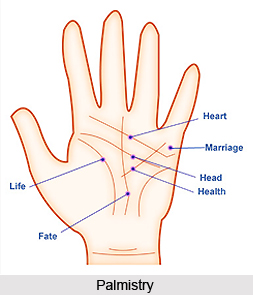 Significance of Right and Left Hand
Significance of Right and Left Hand
Both the right and left hands are significant in their own ways. Traditionally it is believed that right hand represents the personality of an individual whereas the left hand is indicative of the potential of the person. It is also said that past of a person reflects in his left hand while his right hands shows his future. The choice of hand actually depends on the experience and instincts of the palmist. It has also been established that the left part of our brain controls our right hand and inference about the outer person, influence of social environment, experience and education of a person can be drawn from the right hand. On contrary, left hand is controlled by the right part of the brain and it represents the inner person including his natural self and lateral thinking.
Shape of Hands
Study of hands depends on crucial examination of all the features of hands among which the shape of hands is an important one. Various characteristic traits such as creativity, temperament, ambition, energy etc can be predicted with the help of the shape of hands. These shapes are commonly classified into various types such as Earth, Air, Water and Fire. Broad and square hands with thick fingers of ruddy colour are designated as Earth. Air hands generally have rectangular or square palms having long fingers. Short, oval shaped hands with long, conical and flexible fingers are called Water hands. Lastly, Fire hands represent rectangular or square palms having short fingers and pink skin.
Lines of Palms
Examination of the lines of palms is another important feature of palmistry. Commonly three lines are most prominently studied. Heart line which is present under the fingers towards the top of the palm deals with emotions and relationships of a person. Head line is the next important line that initiates under the index finger and runs across the palm towards its outside edge. This line signifies the thought process of a person, his intellect and communication style. Often this line merges with the life line. The third important line on the palm is the life line which starts from above the thumb and travels towards the wrist. This line represents the physical health of a person including his life changes, physical injuries and longevity. Apart from these three lines, there are various other lines on the palms too that signifies other aspects of a person`s life. These include fate line, Sun line, Union lines, Mercury line, Travel lines, Apollo line and Ominous line.
Mounts of Palms
Hands of each individual are divided into segments known as mounts. There are seven mounts present on each hand. Each mount is related to a specific planet and represent the planetary influences on one`s life. Various mounts on the palms are designated as Luna, Venus, Mars, Jupiter, Saturn, Sun, Mercury and Rahu and Ketu. Luna is related to the creativity, imagination and perception of a person. Venus corresponds to the presence of several qualities in a person like charm, kindness, love, harmony, sensuality and beauty. Mars relates to internal energy of a person which is categorized as positive and negative. Jupiter reflects confidence, ambition, justice and leadership in a person. Mount of Saturn indicates coordination and wisdom. Sun represents success, integrity and charisma whereas Mercury symbolises spontaneity, intuition and communicative ability. Mars denotes persistence and endurance. Mount of Rahu and Ketu are intricately linked where Rahu signifies the immediate environment and Ketu indicates the circumstances that had attracted a person in past and his attitude towards them. Study of mounts is ideal for understanding the real characteristics of a person.
Efficacy of palmistry is often questioned owing to the lack of empirical evidences. According to the scientific literature, palmistry is simply a manifestation of superstitious beliefs and is regarded as pseudoscientific. However palmistry is still prevalent in the country and is widely practiced throughout the country. Nowadays it is suggested by contemporary palmists that features of hands keep on changing over time and thus for appropriate characterisation repeated reading is required.
Techniques of Palmistry
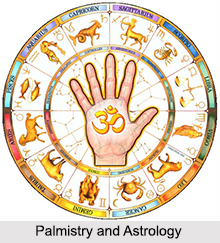 In palmistry, the reader usually starts reading the dominant hand of the person which is the hand an individual uses the most. It is believed that this hand represents the conscious mind which the other one signifies subconscious mind. However, according to some traditions, the other hand is believed to carry hereditary or family traits. Some also believe that it conveys information about past life. The choice of hand depends entirely on the instinct and experience of the practitioner. The left hand is generally controlled by the right brain and is believed to reflect the inner person, the lateral thinking and the natural self. On the other hand, the right brain is controlled by the left brain and is thus indicative of the outer person, the influence of experience, education and social environment and linear thinking.
In palmistry, the reader usually starts reading the dominant hand of the person which is the hand an individual uses the most. It is believed that this hand represents the conscious mind which the other one signifies subconscious mind. However, according to some traditions, the other hand is believed to carry hereditary or family traits. Some also believe that it conveys information about past life. The choice of hand depends entirely on the instinct and experience of the practitioner. The left hand is generally controlled by the right brain and is believed to reflect the inner person, the lateral thinking and the natural self. On the other hand, the right brain is controlled by the left brain and is thus indicative of the outer person, the influence of experience, education and social environment and linear thinking.
Elements of Palmistry
The process of palm reading is done maintaining some basic notions. The study of Palmistry divides the hands of an individual into 3 major sections namely the fingers, the middle of the palm and the lower half of the hand. Each section foretells important traits of the individual viz. the fingers of the hands are the representations of the higher self and the mind of the individual whereas the middle half of the palm depicts the conscious mind of the person and the mundane life. On the other hand, the lower portion of the palm defines health, basic drives of the subconscious and the original instincts of an individual.
The palm reader considers several Palmistry lines for giving the perfect result of palm reading. The Palmistry lines are Head Line, Heart Line, Fate Line, LifeLine and Simian Line. Significant changes between the two palms stand for the radical changes or degradations that the individual had gone through in life. In addition to that, even the colour and quality of the fingernails and skin; the prominence of the knuckles, different qualities of the hand, considering the lines and shapes of the palm and fingers; the sizes of the fingers and palms and several other things are scrutinized by the palm reader to make a perfect palmistry report. In almost all schools of Palmistry, the shapes of hands are considered of major importance as they define some important traits of individuals. As per Palmistry, the shapes of the hands are ramified into 4 or 10 major categories though the modern palmists use only 4 common types of hands namely the Air, Earth, Fire, and Water.
